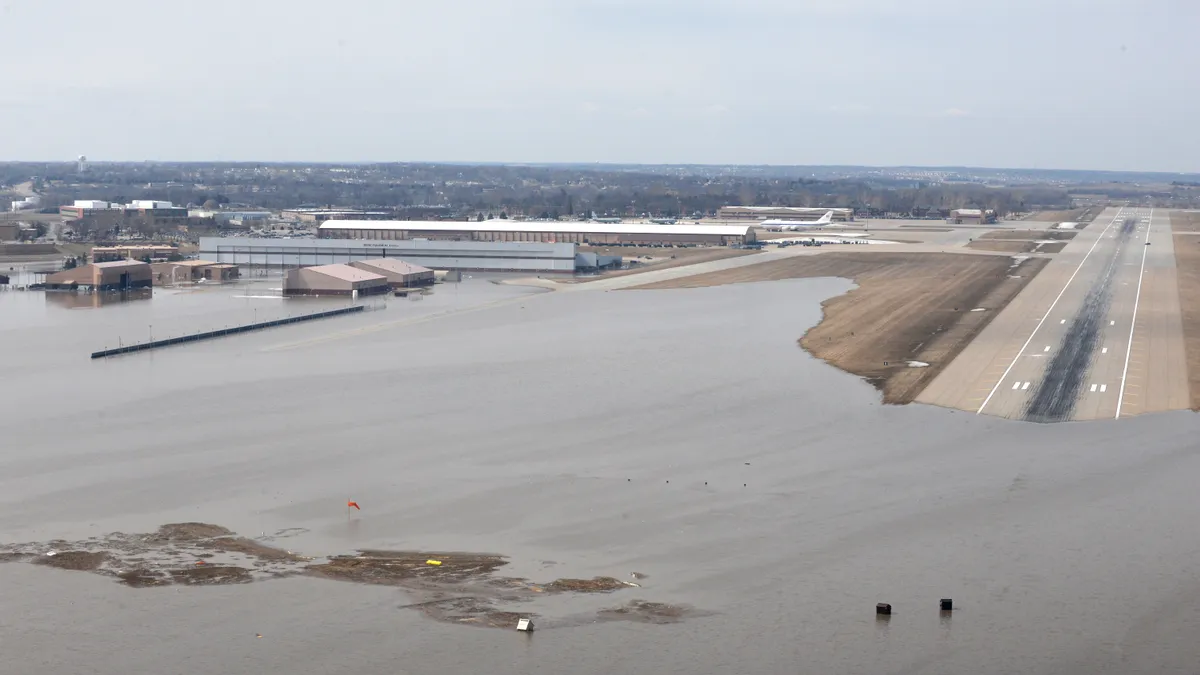Dive Brief:
- Existing flood waters were met with more rain this weekend in Nebraska, where the U.S. Army Corps of Engineers in Omaha said much of the levy system in the area "remains compromised." Sections of major trucking arteries I-29 and I-680 in Iowa, Missouri and Nebraska have been closed for nearly a week, but some parts are beginning to reopen.
- Nebraska Governor Pete Ricketts signed a handful of executive orders last week to keep freight and relief supplies flowing. One order temporarily lifted weight and length restrictions while another waived registration and fuel tax permits until April 15. Kansas Governor Laura Kelly also signed an executive order waiving permit fees to ease the transport of relief supplies and animal feed. Last week, the Federal Motor Carrier Safety Administration issued a Regional Emergency Declaration covering 16 states, suspending requirements concerning hours of service, inspections, hazardous materials transport and parking among others.
- Charley Dehoney, CEO of Manning's Truck Brokerage in Omaha, Nebraska, told Supply Chain Dive the situation stands to have a lasting effect on truck pricing dynamics in the Midwest and Southwest.
Dive Insight:
"With all the trucks tied up in relief efforts, capacity has been extremely tight and shippers are paying for it. Tender rejections went through the roof the past couple of weeks in the region sending shippers into the spot market to move their freight. This is keeping rates unusually high this time of year. Generally speaking, this should be planting season in this part of the country," Dehoney said in an interview.
The flooding has already taken its toll on grain farms, many of which were storing more product than usual due to the Chinese tariffs on U.S. grain. For the farms that will survive, planting season is here, and for produce growers in the region and beyond, early harvests are fast approaching.
"With produce season coming on us quickly it’s going to be interesting to see where the trucks go to maximize their profits," Dehoney said. "We need the supply here in the Midwest, and rebuilding hasn’t even begun. Companies are using their fleets to manage losses and help their neighbors. Fleets can’t get their trucks to shippers who have been stranded fast enough."
He described trucks lined up to help farms to prepare for more flooding, but as the extent of the damage and the timeline for recovery slowly reveals itself, concerns about resuming business are starting to set in. While trucking rates were headed down after a tight 2018, this catastrophe will likely bring them back up and cancel out any upcoming calendar lulls, Dehoney projected.
Off the road, Union Pacific, Norfolk Southern and BNSF continue to asses track damage as the waters recede in some places. The first order of business in doing so, reported Railway Age, is removing felled trees and debris before the state of the tracks can be truly assessed.
The interrupted service has delayed shipments of the fuel additive ethanol, causing industry groups to express concern of price fluctuations, according to Bloomberg.
The National Weather Service warns continued snow melt, on top of already soaked ground, could continue flooding threats nationwide through May.















